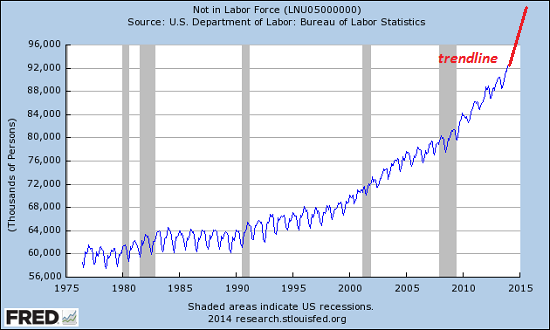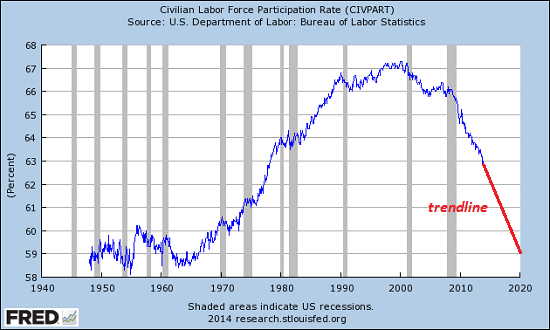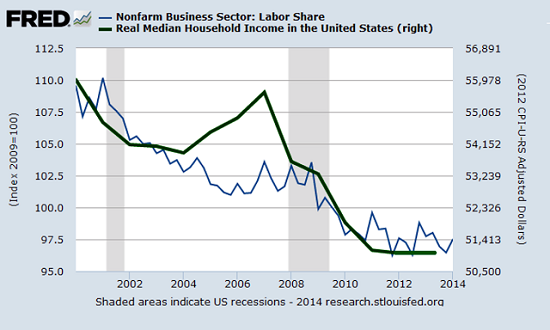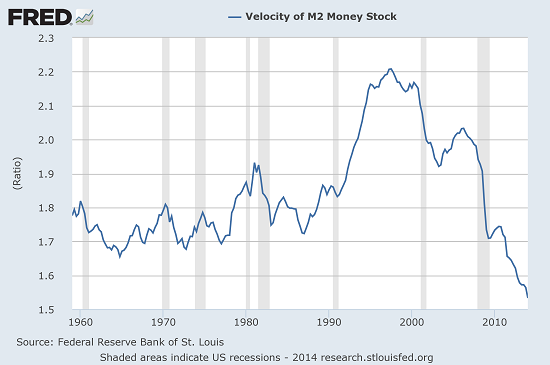The New Misery Index
The Status Quo is desperate to mask the declining fortunes of those who earn income from work, and the Misery Index 2.0 strips away the phony facade of bogus unemployment and inflation numbers.

The participation rate is the more telling metric: if fewer people of working age have jobs, the claim that the Main Street economy is "doing better" rings false.

Even though the rate of inflation is heavily gamed, real median household income is the best available gauge of purchasing power. Purchasing power simply means how many goods and services will your income buy?

This chart also shows labor's share of the non-farm economy: that broad measure of earned income (as opposed to corporate profits, unearned income and rentier income) relfects a steady decline in labor's share of the national income.

Central-planning always leads to ginned-up phony statistics, because centrally planned economies always stagnate due to corruption, malinvestments, and some are more equal than others skims and scams by insiders, cronies, cadres and apparatchiks.
 Are you like me? Ever since my first summer job decades ago, I've been chasing financial security. Not win-the-lottery, Bill Gates riches (although it would be nice!), but simply a feeling of financial control. I want my financial worries to if not disappear at least be manageable and comprehensible.
Are you like me? Ever since my first summer job decades ago, I've been chasing financial security. Not win-the-lottery, Bill Gates riches (although it would be nice!), but simply a feeling of financial control. I want my financial worries to if not disappear at least be manageable and comprehensible.And like most of you, the way I've moved toward my goal has always hinged not just on having a job but a career.
You don't have to be a financial blogger to know that "having a job" and "having a career" do not mean the same thing today as they did when I first started swinging a hammer for a paycheck.
Even the basic concept "getting a job" has changed so radically that jobs--getting and keeping them, and the perceived lack of them--is the number one financial topic among friends, family and for that matter, complete strangers.
So I sat down and wrote this book: Get a Job, Build a Real Career and Defy a Bewildering Economy.
It details everything I've verified about employment and the economy, and lays out an action plan to get you employed.
I am proud of this book. It is the culmination of both my practical work experiences and my financial analysis, and it is a useful, practical, and clarifying read.
Test drive the first section and see for yourself. Kindle, $9.95 print, $20
"I want to thank you for creating your book Get a Job, Build a Real Career and Defy a Bewildering Economy. It is rare to find a person with a mind like yours, who can take a holistic systems view of things without being captured by specific perspectives or agendas. Your contribution to humanity is much appreciated."
Laura Y.
Gordon Long and I discuss The New Nature of Work: Jobs, Occupations & Careers (25 minutes, YouTube)
| Thank you, Arooj S. ($300), for your outrageously generous contribution to this site -- I am greatly honored by your steadfast support and readership. | Thank you, Creig F. ($25), for your wondrously generous re-subscription to this site -- I am greatly honored by your steadfast support and readership. |



























